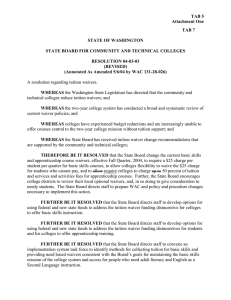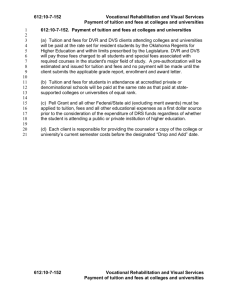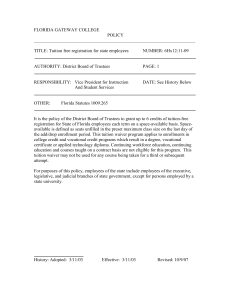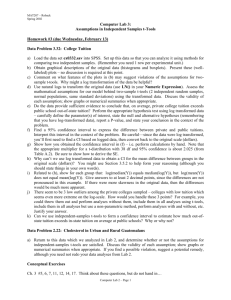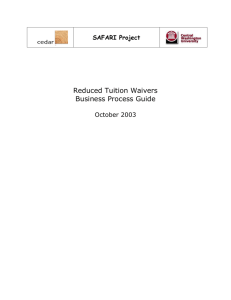Lesson 8b - University of North Carolina
advertisement
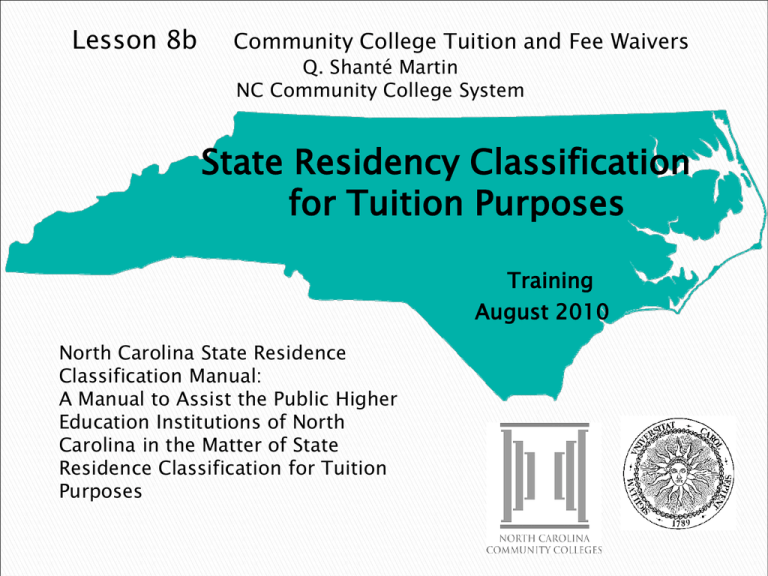
Lesson 8b Community College Tuition and Fee Waivers Q. Shanté Martin NC Community College System State Residency Classification for Tuition Purposes Training August 2010 North Carolina State Residence Classification Manual: A Manual to Assist the Public Higher Education Institutions of North Carolina in the Matter of State Residence Classification for Tuition Purposes The following groups are exempt from tuition at community colleges: ◦ Surviving spouse and children of a law enforcement officer (including sheriffs), firefighter, volunteer firefighter or rescue squad worker who was killed as a direct result of a traumatic injury sustained in the line of duty (including both active service and training for active duty). ◦ Spouses and children of law enforcement officers (including sheriffs), firefighters, volunteer firefighters, or rescue squad workers who are permanently and totally disabled as a direct result of a traumatic injury sustained in the line of duty (including both active service and training for active service). ◦ Persons age 65 or older who are legal residents of North Carolina are eligible for a waiver of tuition charges for up to six hours of credit instruction and one course of non-credit instruction per academic semester at community colleges. ◦ Any child, if the child (i) is at least 17 years old but not yet 24 years old, (ii) is a ward of the North Carolina or was a ward of the State at the time the child reached the age of 18, (iii) is a resident of the State; and (iv) is eligible for services under the Chaffee Education and Training Vouchers Program; but the waiver shall only be to the extent that there is any tuition still payable after receipt of other financial aid received by the student. This waiver only applies to the extent any tuition is payable after receipt of other financial aid. ◦ High school students taking eligible courses at community colleges. These programs include early and middle college, “Learn and Earn” online, cooperative innovative high schools operating in accordance with Part 9 of Article 16 of Chapter 115C of the General Statutes, Huskin’s Bill and Concurrent(dual) enrollment. ◦ It is important to note that the General Assembly has expressed its intent to eliminate tuition waivers for high school students taking courses at community colleges, effective July 1, 2011. The only exception would be to cooperative innovative high schools operating in accordance with Part 9 of Article 16 of Chapter 115C of the General Statutes. ◦ Persons taking courses leading to a high school diploma or equivalent certificate (Basic Skills Program) who are not enrolled in a elementary or secondary school; ◦ Full-time college staff members employed for a 9, 10, 11, or 12 month term for one curriculum or extension course in the system per semester, as well as the summer term in the system; ◦ Law enforcement officers employed by a municipal, county, or state law enforcement agency taking state-mandated Basic Law Enforcement Training Program (BLET) courses; ◦ BLET trainees if a letter of sponsorship from a state, county, or municipal law enforcement agency is on file, are also exempt from tuition; ◦ Patients in State alcoholic rehabilitation centers; ◦ Clients of sheltered workshops; ◦ Clients of adult developmental activity programs; ◦ Students in Health and Human Services Development Programs; ◦ Juveniles committed to the Department of Juvenile Justice and Delinquency Prevention; ◦ Individuals who are either unemployed, have received notification of a pending layoff, are working and are eligible for the Federal Earned Income Tax Credit (FEITC), or are working and earning wages at or below two hundred percent of the federal poverty guidelines taking human resources development courses and have signed a verification form acknowledging that they satisfy one of these factors; and ◦ Prison inmates taking courses tied to clearly identified job skills, transition needs, or both. As adopted by the NC State Board of Community Colleges, the following people may receive tuition and registration waivers for specialized training courses: Volunteer firemen; Local fire department personnel; Volunteer rescue and lifesaving department personnel; Radio Emergency Associated Citizens Team (REACT) members where the REACT team is under contract to a county as an emergency response agency; ◦ Municipal, county, or State law-enforcement officers; ◦ All full-time custodial employees of the Department of Correction; ◦ ◦ ◦ ◦ (continued) ◦ Employees of the Department of Correction’s Division of Community Corrections and employees of the Department of Juvenile Justice and Delinquency Prevention who are required to be certified under Chapter 17C of the General Statutes and the rules of the Criminal Justice and Training Standards Commission; ◦ Trainees enrolled in courses conducted under the Customized Training Program; ◦ Elementary and secondary school employees enrolled in courses in first aid or cardiopulmonary resuscitation (CPR).
